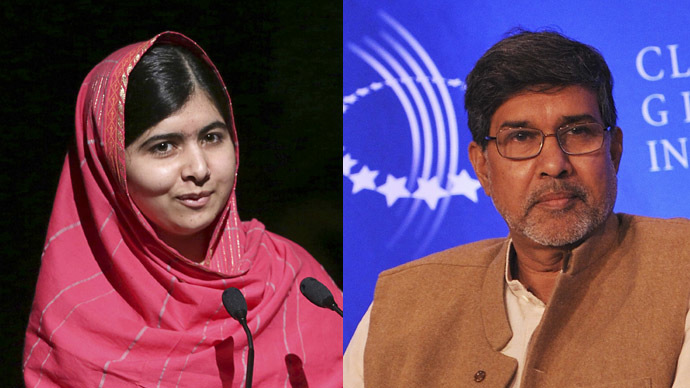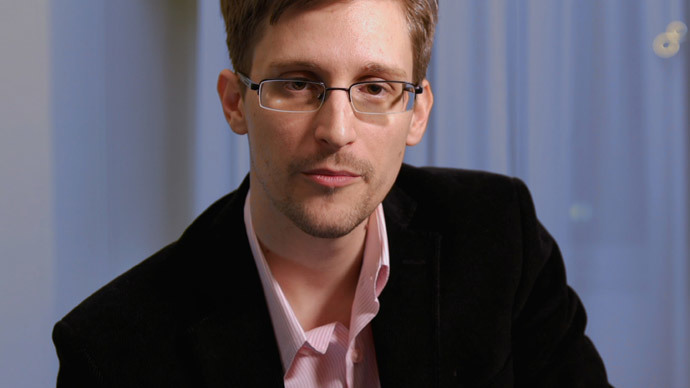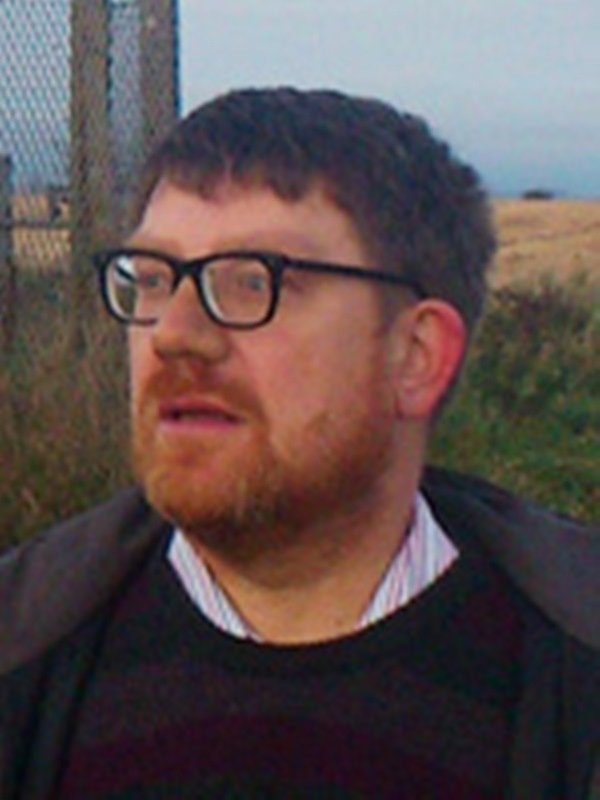Nobel Peace Prize should go to ‘little-known people who made a big difference’

The Nobel Peace Prize should go to small people who deserve more of the spotlight, and not to the people who are big in the public eye, like Barack Obama, because that’s their job to keep the peace, investigative journalist Tony Gosling told RT.
Pakistani teenage activist Malala Yousafzai and Indian children's rights campaigner Kailash Satyarthi have been awarded this year’s Nobel Peace Prize.
At 17 the advocate of girls’ rights to education Malala Yousafzai becomes the youngest Nobel Prize winner. Previously the youngest was Lawrence Bragg, who at 25 shared the physics prize with his father in 1915.
Malala was shot in the head by a Taliban militant in 2012 on her way to school. She survived the attack and continued with her fight for girls’ education.
Kailash Satyarthi, 60, has led a number of peaceful protests and demonstrations against the exploitation of children for financial gain.
RT:The Nobel Prize Committee is often accused of being overly politicized in its decisions. Is that a fair assessment in your opinion?
Tony Gosling: Absolutely yes, because the Nobel Committee is made up of Norwegian politicians who are bound to be overly politicized. But the fact is like many of our international institutions it has been pretty much bought up by the US, it seems. A lot of the decisions that were made seem to be a kind of helping people who are craving approval and a bit vain. Certainly for the last few years we haven’t really seen very fair decisions made. Last year, it was the Organization for the Prevention of Chemical Weapons that won, which is an absolute travesty because the decisions that were made in the investigation into the chemical weapons attack in Gouta, which came as a back-off; they actually overturned the international verdict. There were two people Seymour Hersh, an investigative journalist in the US, and Carla Del Ponte. I think they are much more deserving of the award specifically because they challenged that official view. Both of them proved that it was actually the rebels who had fired these chemical weapons and not President Assad. What is happening slowly it’s being politicized and this has been happening over the last few years. Then we had the EU given the Nobel Peace Prize – it’s bizarre considering the mass poverty.
RT:The Nobel Prize Committee has made many controversial decisions, such as awarding Yasser Arafat, Henry Kissinger, Barack Obama and the EU. Do you think it ever regrets its choices?
TG: I think they probably do afterwards but this is part and parcel of capture politics by big business, the vanity that the Nobel Peace Prize affords. But we don’t have to go too far back to find some quite good decisions that is, for example, Mohamed el Baradei in 2005 from the IAEA authority, he was an Egyptian – really a very good decision. Many people hadn’t even heard of him at that time. And this is really the role of the Nobel Committee – to find people we haven’t really heard a lot about, who have actually made a big difference and give them a bit of a pat on the back and bring them into the media spotlight. One of the people I’d like to see, for example, who still hasn’t been given that prize, is Malalai Joya. She is an MP in Afghanistan who is consistently being speaking the truth about what has been going on in her country and the emasculation of democracy. She is the kind of person whom I’d like to see to win the award.

RT:Edward Snowden'snominationsparked a lot of speculation. Though he didn’t get the prize, do you think Snowden deserves it?
TG: I think he is a very deserving candidate because what he has done is he has highlighted the way that the intelligence services in the West - and I imagine this happens of course in places like China and Russia too - that they actually have been spying and we have proven this now and shown it for all to see - spying on politicians and also spying on people that shouldn’t have been. Warrantless wiretapping actually goes against everything that has been set down after WWII. The whole point of that being to make sure that our intelligence services didn’t get out of control as they did in Nazi Germany and start to spy on citizens, intrude into their private lives in that way. We have got actually evidence now: the intelligence services, NSA, GCHQ are actually manipulating our political parties by spying on them. Edward Snowden has done a fantastic job, I think, actually really as a peace maker in giving politicians a bit of the leg up and informing them on what runaway intelligence services erupt to.
RT:What do you think should be the criteria for potential laureates?
TG: The criteria really should be: first of all, I don’t think it should go to the people who are very big in the public eye, like Barack Obama, those kinds of people, because that’s their job is to keep the peace. What needs to be therefore is to show us, spotlight onto small people who maybe played a tiny role, an insignificant role in the press, but actually do deserve more publicity and more of the spotlight. That’s what’s for I’d like to see the prize used for. That’s what I think Nobel originally back in the late 1800s wanted the prize to be used for. So many other institutions like the International Olympic Committee, FIFA, and these kinds of big institutions have been captured by Western interests, by the rich and almost kind of bought.
The statements, views and opinions expressed in this column are solely those of the author and do not necessarily represent those of RT.
The statements, views and opinions expressed in this column are solely those of the author and do not necessarily represent those of RT.













